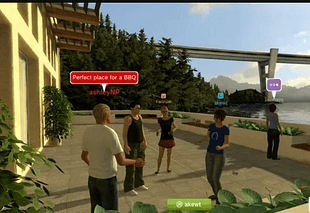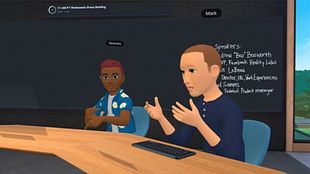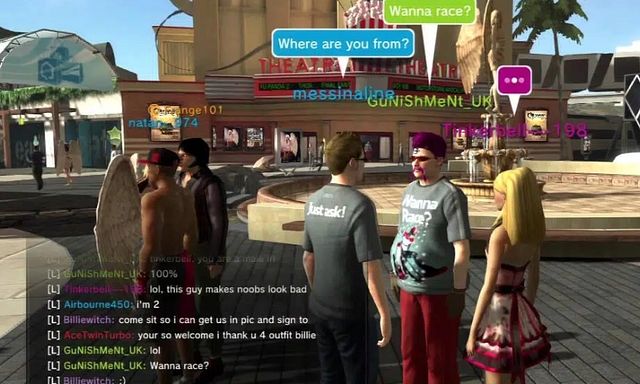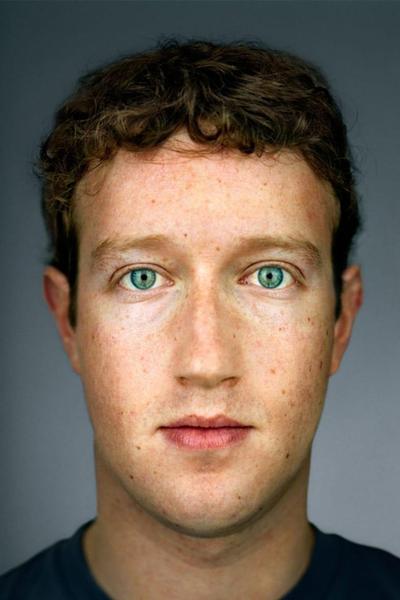Mark Zuckerberg has a problem - his grand experiment in replicating the real world in a virtual one has been the biggest tech flop of the year.
Zuckerberg is one of the most polarising figures in the tech world, and ever since his Oscar-winning performance of a robot playing a human before the US Senate in 2018, the billionaire has kept himself busy.
The project that has kept him busy? Facebook Metaverse.
Ever since people realised that the internet could be used for more than 'Star Trek' fans arguing over which captain was better (it was Picard), starry-eyed visionaries have imagined worlds where friends and family can gather in virtual recreations of the real world.
Picture it: you come home from a long day in the office, strap on your goggles, and you're racing around a tropical island on a jet ski with your mate.
It's all very 'Buck Rogers' or that one Keanu Reeves movie 'Johnny Mnemonic' but Zuckerberg and co have poured billions into an idea that we could have told them for free: a virtual reality world has already been tried by a major company and it was miserable.
PlayStation Home was launched in 2008 by Sony, and it was touted as the killer app that would help Sony claw their way back in the war with the Xbox 360.
Surprise surprise, it was the games that helped the PlayStation 3 overcome its legendarily awful start to life, and PlayStation Home was confined to the dustbins of history.
PlayStation Home is pretty much the same conceit as Facebook's vanity project: you could gather in a virtual town square, decorate your apartment, go bowling with friends, take part in mini-games, or watch films in the in-game cinema.
This was being done in 2008, and if you think "well, internet speeds weren't that great in 2008, were they? And it would be very taxing on hardware designed in the mid-2000s" you would be 100% right.
You spent more time in PlayStation Home looking at loading screens or waiting for characters to fully load, which created this eerie 'Twilight Zone' style effect of being able to interact with someone but their avatar hadn't fully loaded, resulting in them appearing as a ghostly outline while they were loaded into the server.
Even when the game fully loaded, the game had a strange, sterile atmosphere where everything was ultra-white and bright, all the while your detailed avatars were able to buy Diesel t-shirts and wait in line to play bowling.

PlayStation Home was incredibly ambitious, with the inception of the idea coming all the way back in 2004, which reiterates our point that the concept of a virtual meeting place holds appeal for the tech wizards of the world.
By using realistic graphics, PlayStation Home looks a hell of a lot better then whatever Facebook Metaverse is supposed to be, but this was with the trade-off of the game having hilariously long loading times and making content difficult for developers to create content for.
The PlayStation 3 was already notoriously difficult to develop for, so why would developers invest time and resources into something for a niche service like PlayStation Home?
As a result, PlayStation Home was a strange 'The Prisoner' like experience where people were doing the running man while an infinite loop of a PSP ad played in the background.
The service saw a dedicated fanbase, and indeed the closure of the service in 2015 was greeted with dismay by long-time fans, but PlayStation Home never became anything more than a novelty than a generation-defining experience.
PlayStation Home was a noble failed experiment, but the results of a failed experiment are meant to be picked up on and learned by future generations so they don't make the same mistake.
With hard economic times bearing down on us again, asking consumers to pony up for a Zuckerberg vanity project seems too tall an order.
Facebook Metaverse looks like if someone tried to make 'The Truman Show' if they had exactly the cost of a Tesco meal deal to create the virtual enviroment, but this was by design.
To give Zuckerberg and his team credit, they realised that the average Joe or Jane doesn't have a high-end gaming PC or a top-of-the-line smartphone to process photorealistic graphics, and to compensate, they made the graphics as low-polygon as possible so that everyone could play.
It is a noble attempt to get everyone on board, but the graphics have been the subject of ridicule.
The announcement that Facebook avatars were able to have legs was greeted with bemusement, as it is a sentence that is hilarious out of context and it begs the question - why didn't the avatars have legs to begin with?
Facebook Metaverse is caught in the middle - if it makes the graphics too highly detailed, it runs the risk of reducing the frame rate to a slideshow for the average consumer, but their simplistic lo-fi approach makes the game look like someone put a Nintendo Wii in a washing machine.
Trying to make the service as accessible for a wide an audience as possible is worth commending, but when those consumers are laughing at memes about how the graphics look daft, Facebook's gamble is looking more like a lost cause.

The initial uptake for the service has been dismal, with the average userbase sitting at less than 200,000 - well short of internal Facebook projections of 500,000.
There is another factor in the failure of the project - it came out at a bad time.
With an economic recession looming and finding the money to keep the lights on a very real day-to-day reality for consumers, splashing out on a headset so you can play snooker with Facebook friends you secretly hate is a non-starter.
There is some appeal in wanting to escape to a virtual world where you can replicate real-life actions, but it appears no one at Facebook was aware of a little game called 'Grand Theft Auto' and its wildly successful online mode that allows you to do just about anything.
Ever since 'World Of Warcraft' dominated the world in the 2000s, the hunt has been on for the next big time sink for people to spend their days in, and Facebook is simply coming to the party too late.
The big factor with virtual reality worlds is that absolutely no one can look cool wearing the headset.
This stigma was a quiet factor in 3D films going into decline after the initial 'Avatar' boom because no one wanted to impersonate Roy Orbison when they took a trip to the local cinema.
The new Quest Pro headset is on the more high-end scale and will retail for $1,500, and Zuckerberg is hopeful that people plopping on the headset will replace the traditional office.
Asking people to pay that much for a headset is a tall order, especially when there is no guarantee that the service will even exist in 5 years.
In economics, one of the most prominent theories is that of the "sunk cost fallacy" whereupon you've spent so much money on a product you have to persevere with the product despite knowing it's failing to meet sales expectations.
Yahoo Finance reported that Facebook spent $10 billion developing their Metaverse in 2021 alone.
The company could have saved that money by simply doing their homework - if the technical genius and knowhow of Sony can't make PlayStation Home work, then what hope does Facebook have?
Every company has their rough phases, with Nintendo bouncing back from the failure of the Wii U to give us the Switch or Apple learning their lessons from the Newton to bless us with the iPod but with the odds so stacked against Facebook's virtual spectacle, it may well be remembered along with the Sinclair C5 as a great idea that was lacking execution.













































































